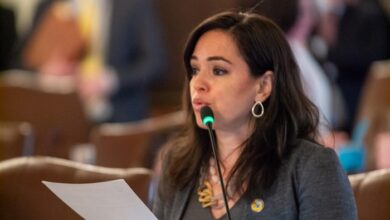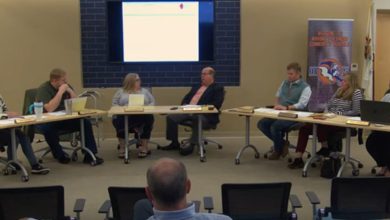Fact Check Hennesy and McComb: Curriculum
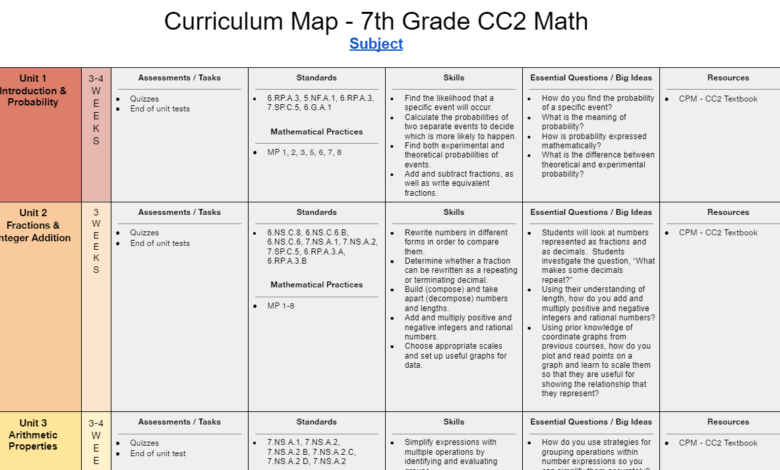
On Jan. 31, 2023, Mahomet-Seymour Board President Max McComb wrote an opinion piece for the News-Gazette in rebuttal to what board member Meghan Hennesy said at the Jan. 17, 2023, regularly scheduled board of education meeting. The following are just excerpts from those pieces. Hennesy’s speech (Jan. 17) can be found here. McComb’s opinion piece (Jan. 31) can be found here.
This project is not an attempt to look at every issue that was brought up in its entirety. This publication has reported on some of these issues before. In those cases, links are provided so that each reader can learn more about the issue. The articles that follow are an attempt to look at the claims each board member brought up. In some cases, one board member named others. In those cases, this publication looked at what happened surrounding those claims. All of the articles can be found on this page. Each article also includes documents and videos referenced.
We understand that this piece comes two months after these events took place. We have taken time to watch discussions of every topic over the last three years, to look at board agendas and minutes from the same time period, to read emails, to send FOIA requests and to undertake a major project in analyzing TIF data. This work took time, and that is why it took so long to complete.
Quotes from Hennesy
“I don’t believe that we are going to address curriculum. Curriculum has been a blank spot since before I joined the board. Four years later, it’s still a blank spot. Before the gaslighting starts, and I’m told look at the website, I have looked at the website. What you see on the website, primarily our learning standards and learning standards is not curriculum. In the time that we have had directors of curriculum this district has spent over a million dollars in salary. And if I look at that website, I don’t feel like that value is translated into the work that we do.”
Meghan Hennesy
Quotes from McComb
“Mrs. Hennesy and Dr. Schultz say they have concerns about ‘curriculum’ but can’t explain those concerns, disagree about proposed changes, have spent four years complaining about our assistant superintendent in charge of curriculum, and then tried to block her when she recently resigned.”
Max McComb
Editor’s Note: Meghan Hennesy’s comments on the Assistant Superintendent are addressed in another piece. The following does not recount all discussions and viewpoints provided in discussion of the Mahomet-Seymour Board of Education, but rather looks at what Hennesy and Schultz have done and said over the last four years so that the community can judge for itself if the two board members have explained their concerns.
Looking Back
Part of Hennesy’s speech highlighted how she had talked to the Mahomet-Seymour School Board about curriculum years before she was elected to the board seat she currently holds. This is true. Hennesy stood before the board on several occasions, asking them to provide a curriculum for parents to see, to address bullying and drug use, to have a plan for 1-to-1 Chromebook use beyond students just having them in class or at home, and talked at length about student privacy and data collection within the Acceptable Use Policy parents are required to sign at the beginning of each school year.
At that time, discussion about the Mahomet-Seymour curriculum did not go beyond her allotted public comment time.
It took nearly two years after Hennesy was elected in 2019 for a serious discussion in relation to curriculum to happen among board members. Although former students addressed the board of education in the summer of 2020, focusing on the lack of accurate historical information within their primary and secondary time at Mahomet-Seymour, the board didn’t pay much attention to the instructional materials throughout the district until parents and community members came to the board in the summer of 2021 to read excerpts from books they felt included controversial topics and inappropriate words.
The next month, board member Colleen Schultz read a statement she made to the board of education in 2014. She said then (and again in March 2023):
Recently my nine year old daughter was given a book to read during her school reading group that included several profanities and controversial themes. My husband and I find the content to be inappropriate for a nine year old. The classroom teacher and principal believe that the content is appropriate and that it will remain in the classroom. Clearly, everyone has a different idea of what is appropriate. Reasonable people can disagree.
This incident was the motivation for why I am coming to the school board today, but I am not coming today to comment on particular material presented in the classroom. I am not here to ask you to ban books, impose censorship, or micro-manage teachers. I am not here to try to dictate what is or what is not taught in the classroom.
Today I am here to advocate for a policy of increased transparency between our schools and the parents as well as a policy of having an appropriately leveled alternative for students whose parents opt their student out of reading a particular book that they feel is inappropriate for their child.
Such policies would assure collaborative relationships between students’ families and the schools and would enable parents to become active partners in their children’s education.
As it is the responsibility of the Superintendent to keep parents thoroughly informed about their child’s education and to encourage them to be involved, establishing effective two way communication between the parents and the district, I am asking the Board to direct the Superintendent to create a policy for the district that increases the level of communication as to ensure that principals and teachers communicate with parents clearly and effectively especially regarding the content of the curriculum.
I would like to see a policy where parents are informed of the books and other course materials presented in the classroom in an amount of time that the parent can reasonably review the material.
It seems reasonable to have course materials for each grade’s curriculum to be available for parents to look at. It seems reasonable the teachers in grades 3-12 inform parents when they add books or materials to the standard curriculum—for example teachers’ choices of books in reading groups.
I believe a policy is needed because the practice of the district has not been sufficient. And if there is already a policy, it’s not being enforced.
I am advocating for a policy that would be proactive and provide the opportunity for conversations and discussions between the schools and parents and be pre-emptive in helping to stop problems before they occur. The policy is not for the purpose of encouraging parents to complain more, just the contrary. When the parents and schools work together, there can be a reduction in conflict. Transparency between the schools and the parents will also permit the parents to have more productive discussions with their children at home, only making their education at school more effective.
I have met with our superintendent [Rick Johnston: 2013-2017] previously to discuss these issues. He told me that “when your child is at school, you are not the parent of the child, the teacher acts as the parent of the child and the teachers will decide what is appropriate for the child to see.” I vehemently disagree with this entire line of thought. I am my child’s parent—24 hours a day 7 days a week. The transparency between parents and schools has not improved since that meeting. Thus I feel it is appropriate to bring my concerns to the Board level.
The natural reaction to a request such as this may be to say “we don’t need that here in Mahomet”. That may have been true years ago when there was a much smaller diversity of opinion on what is or is not appropriate. But, today, there is a greater gap between the conclusions of reasonable people. It seems certain that this gap will only increase in the future.
I would be happy to work with the district or administrators to collaborate on a feasible policy and would be happy to participate in the continued discussion of increased transparency between the district and parents.
Colleen Schultz (2014 and 2023)
I hope you seriously consider my comments tonight and (at the appropriate time) take action to provide a better pattern of communication between parents and the schools.
Thank you for serving the school district and thank you for listening to my comments.
In this discussion, it is important to understand the difference between instructional materials and curriculum. It is defined in Mahomet-Seymour School Board Policy. Policy 6:40 addresses curriculum development:
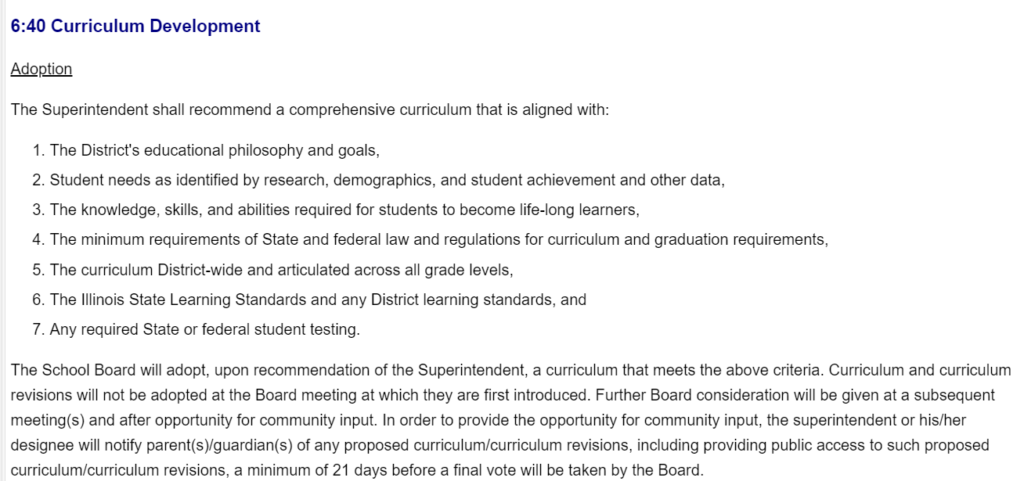
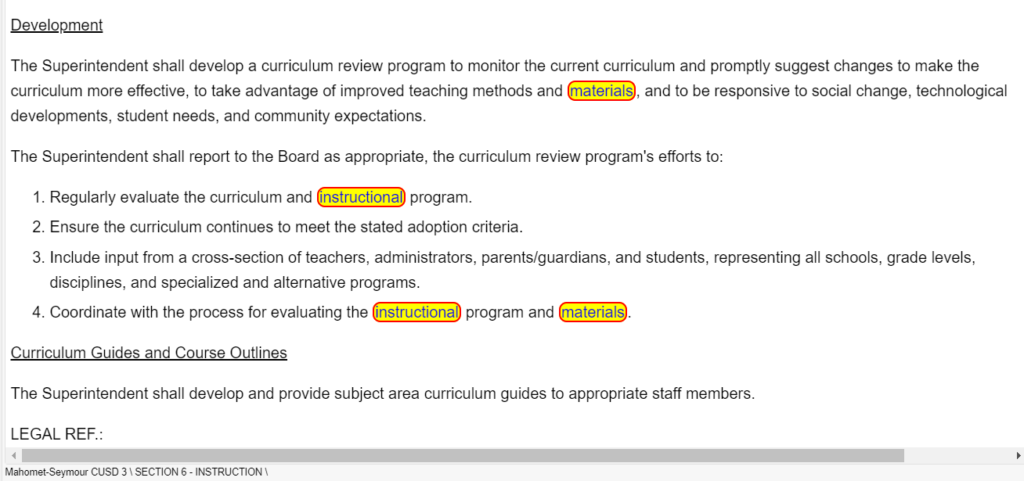
Policy 6:210 addresses Instructional Materials:
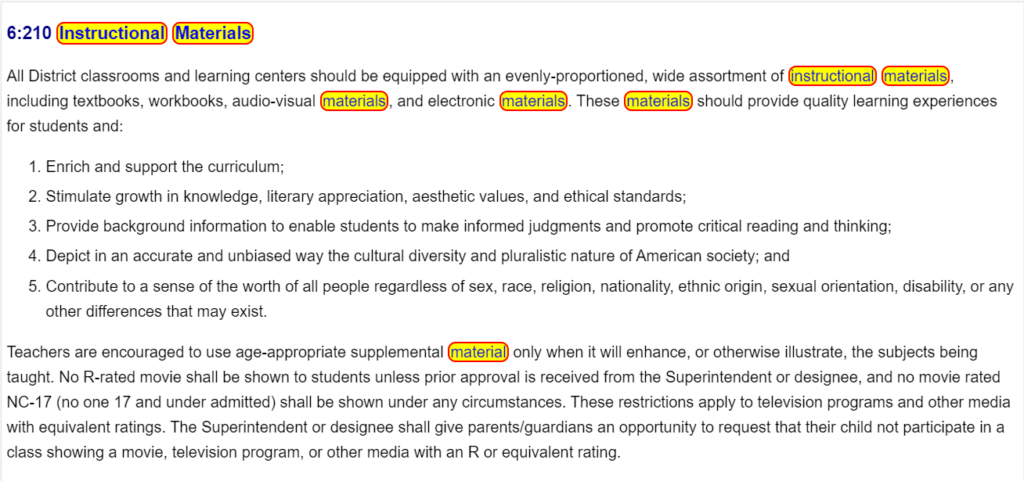
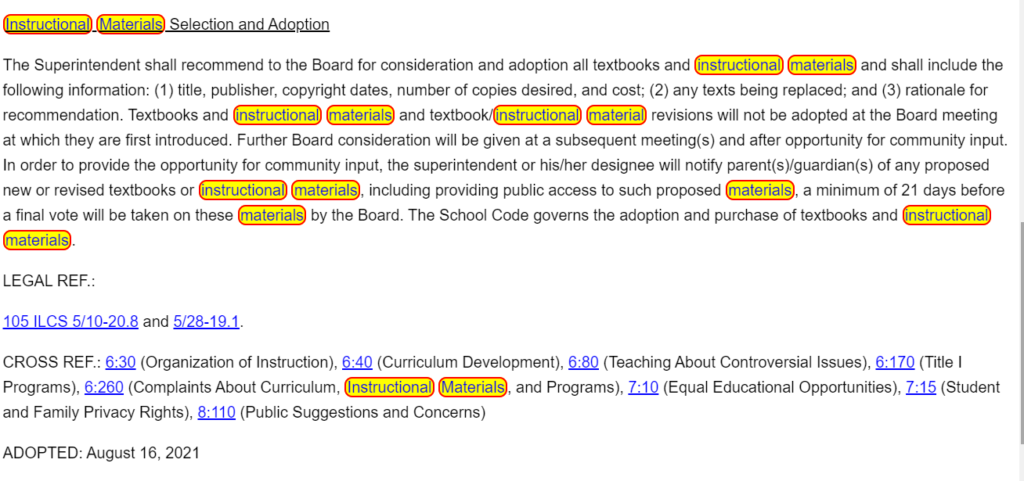
Instructional materials are approved by the Mahomet-Seymour School Board, oftentimes without discussion as they are within the consent agenda. District administration and staff also have brought new courses to the board of education for review, and those topics do include more discussion after a presentation by staff. But, according to statements made by both Hennesy and Schultz over time, these agenda items are not curriculum. They are looking for something that shows the priorities and scope of a student’s education over the 13 years they may be within the district.
After reviewing almost 10 board meetings where curriculum and instructional materials are discussed, Hennesy has said, in short, that she does not believe the standards and lists of books the district has put on its website over the last two years meet the district mandate for a curriculum. She has said this task of transparency should not be put onto the teacher’s shoulders, but rather, as the Assistant Superintendent, who is responsible for curriculum development, establishes the scope, he/she should be the one who makes those priorities, decisions, and materials available to the public.
Hennesy has also said that she believes that parents should be able to have access to the materials their child will be exposed to at school and that the Mahomet-Seymour School District should develop something akin to Common Sense Media where parents can assess information about the material in order to make decisions and how that material may affect their child. She does not believe in banning or censoring materials, but in the district’s role in helping parents understand the materials, themes, and objectives behind what is being taught.
This perspective has been shared by Schultz, who has introduced several policies in regard to the curriculum in her four years on the board. These measures echo what she asked for in 2014.
In Aug. 2020, Schultz worked with Mahomet-Seymour High School Principal Chad Benedict on Policy 6:335. Hall gave her nod to this proposal, and the board followed suit, eliminating class rank at Mahomet-Seymour High School, allowing students to work towards fulfilling the requirements for graduation without the added stress of competition among peers.
While this measure did not have any bearing on what is taught in the schools, Schultz and Hennesy have continually advocated for student choice in fulfilling graduation requirements with courses that meet the child’s academic needs or wants.
This was evidenced again in March 2023 when Hennesy proposed Policy 6:310, which would allow students to supplement Mahomet-Seymour courses with courses from other institutions. This policy will not move on.
In July 2021, Schultz introduced a policy to the Mahomet-Seymour School Board that requires the board to have at least two readings of a curriculum policy before it is adopted. In this, Schultz said that the policy was just solidifying what the district already practiced by giving the Mahomet-Seymour community access to materials and curriculum changes before they were implemented into the school.
Board policies 6:40 and 6:210 are referenced above. But when Schultz made the motion to adopt the policy in July 2021, she included that communication about curriculum pushed out to parents should also be done electronically, not just in board meetings This is how the board of education voted these policies through, yet that requirement is still left out of the board policy manual.
Board minutes from July 2021 read:
Motion was made by Schultz, seconded by Hennesy, that policy 6:40 be updated to read, “Curriculum and curriculum revisions will not be adopted at the Board meeting at which they are first introduced. Further Board consideration will be given at a subsequent meeting(s) and after opportunity for community input. In order to provide the opportunity for community input, the superintendent or his/her designee will notify parent(s)/guardian(s) of any proposed curriculum/curriculum revisions, including providing public access to such proposed curriculum/curriculum revisions (pushed out electronically), a minimum of 21 days before a final vote will be taken by the Board.” And, 6:210 be updated to read, “Textbooks and instructional materials and textbook/instructional material revisions will not be adopted at the Board meeting at which they are first introduced. Further Board consideration will be given at a subsequent meeting(s) and after opportunity for community input. In order to provide the opportunity for community input, the superintendent or his/her designee will notify parent(s)/guardian(s) of any proposed new or revised textbooks or instructional materials,
Mahomet-Seymour Board minutes July 2021
including providing public access to such proposed materials (pushed out electronically when possible), a minimum of 21 days before a final vote will be taken on these materials by the Board.” The motion was approved by “yes” vote, 6-1. Member McMurry voted no. Motion carried.
In a discussion about both policies, Hennesy suggested that the district find a way to push notifications out to the community, not just parents of Mahomet-Seymour School District, in regard to curriculum changes. McComb and Hall agreed.
Over the next few months curriculum discussions continued as board member Jeremy Henrichs tried to get policy 6:210-E1 through, establishing a district-wide form for instructional materials so that educators could communicate information about materials, and so that parents could evaluate what their child would experience in each class. Henrichs did not call for materials to be pulled, but rather for the district to provide an educational equivalent if a parent objected to instructional material.
There was discussion among administration and board members about the work educators would have to do for this, the established procedures for approving materials, the difference between materials in elementary and secondary schools, and the line of acceptable and inappropriate.
Most board members agreed that the approval process for instructional materials had fallen short and that communication to parents had also as community members came to the board in 2020 and 2021 stating so. Most board members and administration agreed that providing a syllabus from all classes would be a great way to bring that gap.
Hennesy added that she believed the process should be streamlined district-wide so that would be able to digest the information efficiently. Hennesy said she believed the responsibility for this fell on the administrators, not the teachers.
Henrich’s motion or form was never brought back for discussion or approval, even though Schultz requested the agenda item be added.
As the district embarked on the Bulldog Blueprint for the 2022 referendum, Hennesy suggested that the district should take a similar approach with curriculum, gathering feedback, either in-person or through surveys, so that the district could understand exactly what constituents want and need. Schultz agreed, adding that the district website was a good place to put their curriculum, but if constituents didn’t know it was there, they may not know how to access the information.
While Hennesy does not believe the standards provided on the district’s Curriculum Page are a curriculum, but rather learning standards for each grade level and subject, constituents do have more information than they did in 2016, 2019 and 2021. With Hennesy, Henrichs and Schultz calling for transparency of instructional materials in 2021, the district also has a Textbooks and Common Text page.
Although McComb feels that Hennesy and Schultz have not provided their concerns or solutions over the last four years, meeting agendas, minutes and videos suggest otherwise. The two board members have advocated for the development of a curriculum, transparency in that curriculum and freedom to choose courses that fit each individual student’s needs as they plan for the future.
It should also be noted that Schultz has stated a few times in board meetings that she has met one-on-one with McComb to discuss her vision and the community’s concerns with the curriculum. After Henrichs proposed policy 6:210, it never came back to the board for further discussion or a vote. Schultz also emailed McComb asking for it to be on the agenda, following procedures set forth by board agreements and board policy 2:230.

